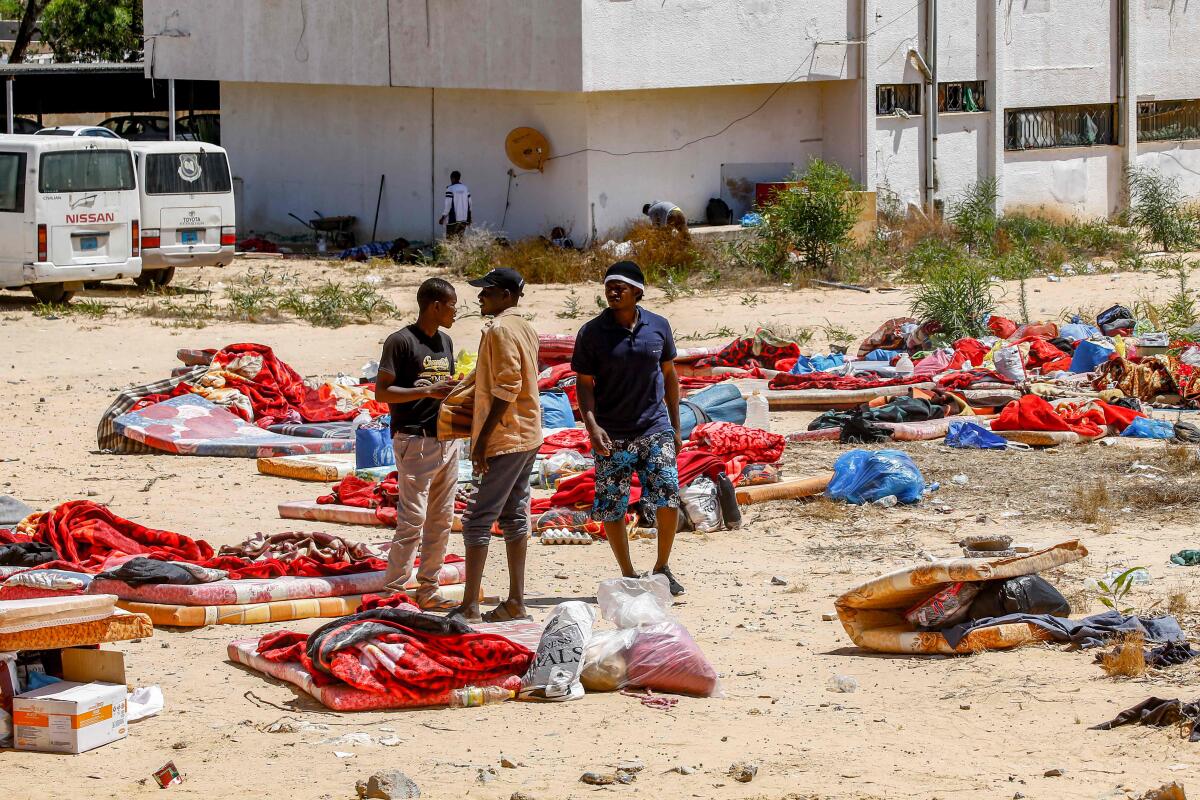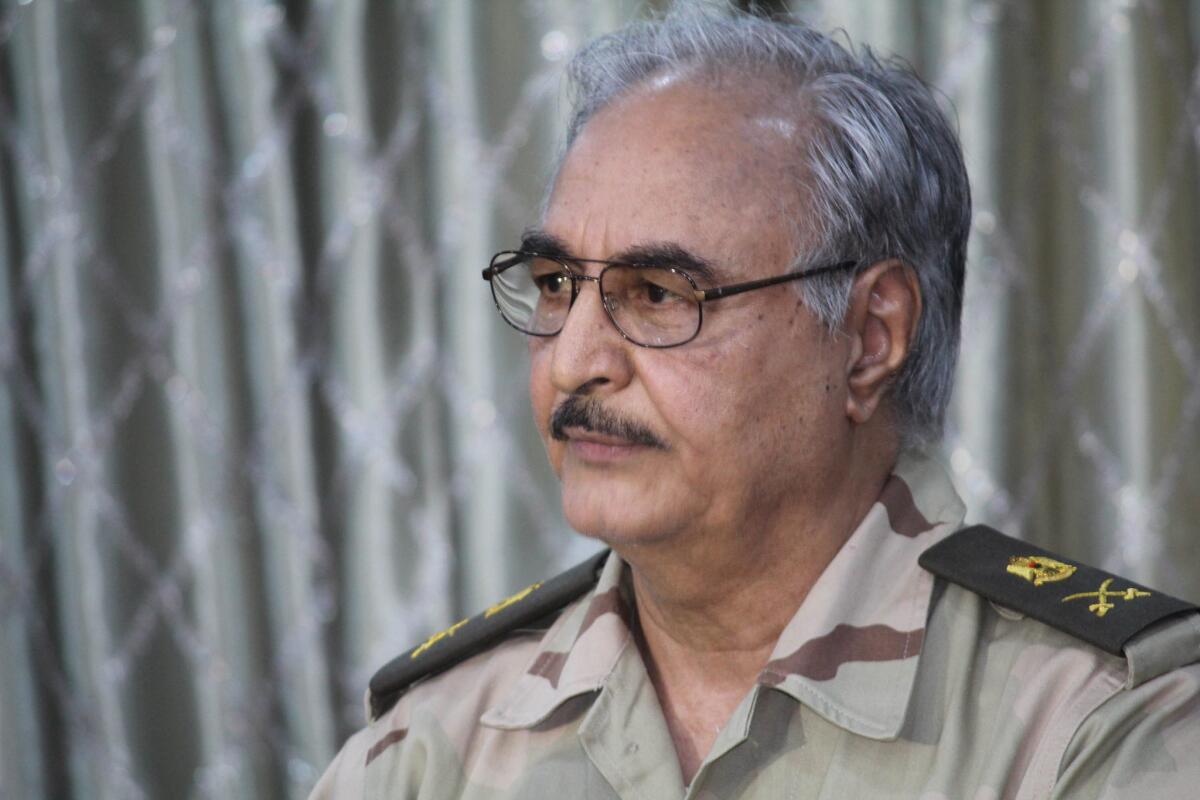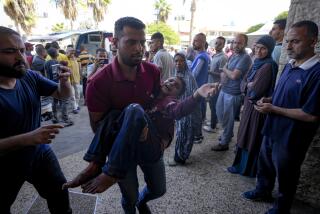Libya civil war and natural resources attract mix of nations

- Share via
BEIRUT — On the southern edge of Libya’s capital, drones belonging to Turkey and the United Arab Emirates fly missions against forces on opposite sides.
Below them, mine-resistant vehicles provided to Libyan government forces by Turkey hunt for Jordanian-built armored personnel carriers supplied by the UAE, which supports a rival government operating from east Libya.
Nearby, militiamen including mercenaries from Sudan and Chad smile while taking selfies atop pickup trucks supplied by Saudi Arabia as they load large-caliber machine guns bought from Belarus and Russia.
The head-spinning mix of countries represented by military personnel and equipment in Tripoli, as described by U.N. officials, activists and analysts, comes as the oil-rich North African nation’s latest spasm of violence pits aspiring strongman Gen. Khalifa Haftar and his self-styled Libyan National Army against the Government of National Accord of Libya led by Prime Minister Fayez Serraj.
Almost eight years since a revolution backed by the North Atlantic Treaty Organization led to the ouster and killing of longtime dictator Moammar Kadafi in October 2011, Libya has become an arena for regional and international rivalries. The materiel flooding the country’s battlefields betrays a larger conflict: one that has turned Libya into an international chess game embroiling the region’s potentates, Western powers — including the U.S. — and Russia.
A triad of the UAE, Saudi Arabia and Egypt, with France backing them, support Haftar against the Tripoli government and its allied armed factions, which are backed by a Muslim Brotherhood-friendly alliance between Turkey and Qatar. Each side lavishes weapons, trainers and money on supported factions, while other countries provide assistance too despite a long-standing United Nations arms embargo on Libya ostensibly agreed on by all countries involved.
“More than ever, Libyans are now fighting the wars of other countries who appear content to fight to the last Libyan and to see the country entirely destroyed in order to settle their own scores,” said U.N. Special Envoy to Libya Ghassan Salame in an address to the Security Council this week.
And arms, he said, go into Libya “with the complicity and indeed outright support of foreign governments.”
Much of that support has gone to Haftar, who portrays himself as the only figure capable of delivering stability to Libya. Under the rubric of counterterrorism, he has wielded international assistance since 2014 to control the rival government holding Libya’s east and capture the south.

In April, 10 days before a diplomatic conference ushering in a political settlement, he moved on Tripoli in a bid to consolidate his grip over the country. France, the UAE and Egypt denied having prior knowledge of the operation.
Haftar vowed to take the city in 48 hours, but roughly four months later, the offensive remains bogged down by a vigorous defense by factions allied with the Government of National Accord. More than a thousand people have been killed and hundreds of thousands displaced during the past few months.
Over that time, Haftar’s fighters regularly showed off weapons received from their backers.
They posted on social media images of armored troop carriers, identified by experts as those produced by an arms company in Dubai, and U.S.-made Caiman mine-resistant vehicles provided by the UAE, according to U.N. officials and analysts.
In May, fighters aligned with the Serraj government also boasted of their own arms deliveries, uploading pictures of Kirpi armored vehicles provided by Turkey. Days later, Haftar’s forces showed off a fresh shipment of armored trucks produced in Jordan.
Serraj’s government said in July that it had recovered four U.S.-made Javelin missiles during a raid on Gharyan, a town south of the capital that had been the headquarters for Haftar’s Tripoli offensive.

A State Department investigation subsequently found the missiles had been sold to France. French officials denied they had been transferred to Haftar, which would constitute a violation of both the sales agreement with the U.S. and the embargo. Instead, French special forces in Libya, officials said, had judged the weapons to be defective and had lost track of them as they awaited destruction.
There was no explanation from officials of why the missiles were in Gharyan or if there were French military personnel in the town during the raid.
Meanwhile, Haftar’s international backers helped him orchestrate an accompanying air campaign, said Anas Gomati, head of the Tripoli-based think tank the Sadeq Institute.
The UAE had established a base, Khadim, in 2016 in eastern Libya. It housed not only Chinese-made Wing Loong drones, according to a U.N. panel of experts in 2017, but also Air Tractor planes converted for combat use and operated by a company associated with former Blackwater founder Erik Prince. The base also served as an operation room for French special forces on counterterrorism missions in Libya.
Both sides also hired pilots from abroad to fly their aging fleet of Mig warplanes along with mercenaries to bolster their ground offensives.
Activists published photos of the Wing Loong drones firing rockets on targets in Tripoli in recent months, prompting an investigation from U.N. sanctions monitors into involvement by the UAE.
The GNA also accused Egypt and the Emirates of flying F-16 warplanes to conduct airstrikes. The planes, said Libyan Interior Minister Fathi Bashagha, were used to bomb a migrant center near Tripoli in early July in an attack that killed 53 people. The opposition said it had targeted a nearby militia building.
Haftar’s allies have shielded him from international opprobrium, said Gomati. The U.S. blocked a security council statement condemning Haftar following the attack on the migrant center. Earlier, France had stopped the EU from issuing a statement blaming the general for the violence in Tripoli and called for a ceasefire instead.
Other support included planeloads of Libyan 20-dinar banknotes, printed in Russia and delivered to banks in Haftar-controlled eastern Libya.
At the heart of the international conflict are Libya’s natural resources. The nation has Africa’s largest oil reserves, as well as mineral deposits and more than a thousand miles of coastline on the Mediterranean.
Countries have different motivations for their involvement, even if they support the same side, said Jalel Harchaoui, a Libya expert at the Clingendael Institute, a think tank based in the Hague.
One fight in Libya is over the legacy of the 2011 Arab uprisings. Qatar and Turkey had supported Islamist groups that would emulate the model of political Islam practiced by Turkish President Recep Tayyip Erdogan, said Harchaoui.
The UAE and Saudi Arabia, concerned for their monarchies, had arrayed themselves against those revolutions, advocating a return to the military-style dictatorships the uprisings had dislodged.
But Libya has also become a part of the UAE’s economic conquest of Africa. The Emirates’ Dubai Ports World, a top ports operator, already managed facilities in Djibouti, Somaliland and Algeria. Libya, said Harchaoui, would become part of the Emirates’ “string of pearls” on Africa’s coast.
Turkey has ports and bases in Sudan. It had billions of dollars of investments in Libya even during Kadafi’s rule, though it supported rebels once they had gained momentum, including the Islamist factions now holding Tripoli.
If Haftar ousts them, Turkey would have a problem, because it is in a battle over sovereignty rights in the eastern Mediterranean, where the prospect of huge reserves of hydrocarbons has sparked a race for control against Greece, said Selim Sazak, a Turkey expert at Brown University.
U.N. agreements give nations almost 200 miles of maritime territory from their coastline where they have an Exclusive Economic Zone, or EEZ, for drilling, fishing and other activities.
Depending on how you draw the lines, said Sazak, Turkey would lose much of its access to hydrocarbon reserves; even its fishermen would be unable to send out their trawlers. A deal with Libya would help counter both Greece and Egypt, Sazak said.
France has worked with Haftar against Al Qaeda’s African branch as well as Islamic State.
Italy has been concerned with immigration from Libya’s shores. It has supported the GNA’s coast guard units, paid off human smugglers and funded militias running detention centers.
Russia has worked with all sides, said Gomati, using Libya “as a theater to disrupt its opponents.”
In his security council address, Salame warned there were indications the weapons flooding Libya were either falling into the hands of terrorist groups or being sold to them. Though he beseeched council members for help in stopping the war, he also appealed to Libyans “to listen to their better angels.”
More to Read
Sign up for Essential California
The most important California stories and recommendations in your inbox every morning.
You may occasionally receive promotional content from the Los Angeles Times.











